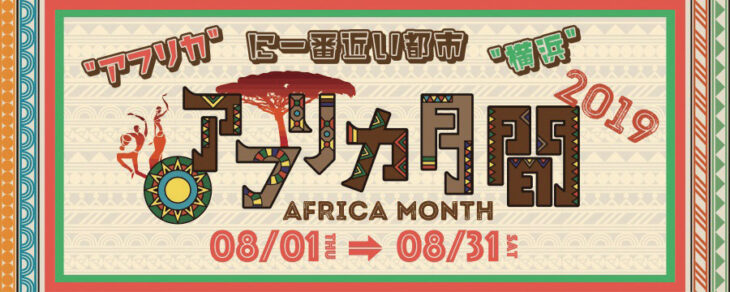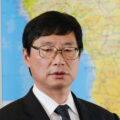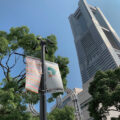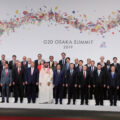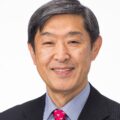Yokohama: The “Closest City to Africa” in Japan
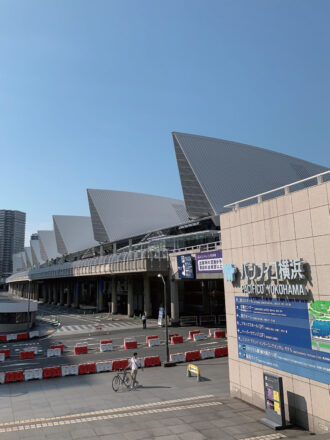
The Pacifico Yokohama conference center in Minatomirai, Yokohama
The City of Yokohama is putting the finishing touches on preparations to host TICAD7. The white-finned roof of Pacifico Yokohama, the main venue for the conference, has been scrubbed clean and now the surrounding greenery is getting a trim. Festive TICAD bunting is fluttering along the Grand Mall promenade as the city looks forward to celebrating its exceptionally close ties with Africa.
Yokohama hosted the last two TICAD conferences to be held in Japan, TICADs IV and V, in 2008 and 2013, respectively. (TICAD VI was held in Nairobi, Kenya). TICAD V attracted more than 4,500 participants, making it the largest international conference in Japan and, as such, no small organizational feat. As TICAD host, however, Yokohama has not merely provided the venue and hospitality for the conference. More significantly, the City has worked to engage with African countries year-round using the opportunities TICAD provides. Yokohama strives, in the words of Mayor Hayashi Fumiko, to be the “closest city to Africa” in Japan.
Waste Management
Yokohama is Japan’s second largest city after Tokyo with a population of 3.7 million, but while it has expanded rapidly since the port opened in 1859, the City is still of a scale that local government initiatives can have an almost immediate impact on the lives of residents. One example is Yokohama’s G30 plan for waste reduction. Under the plan, established in 2003, the City set a goal of reducing waste by 30% by 2010. Remarkably, a reduction of 34% was achieved by 2005, just two years after the plan’s introduction. The main method for achieving this dramatic reduction in costly incinerable waste (a 43% reduction as of 2018) was simple: to ask citizens and corporations — in a sustained and coordinated fashion including some 11,000 public briefings — to separate their refuse into ten categories.
Education, in other words, was the key to changing long-ingrained waste disposal habits and saving the City — and the environment — a small fortune in new incinerator construction costs.
Yokohama has since sought to share its experience and knowledge of rapid population increase and associated problems of waste management with developing countries including countries in Africa. Yokohama invites government and other personnel from Africa to witness firsthand the flow of waste management in the city, from separation, collection and treatment through final disposal, and shares details about its laws and systems so that they may be implemented or adapted by countries going through the same kind of challenges experienced by Yokohama.
Following a successful waste management seminar hosted by Mayor Hayashi on the sidelines of TICAD VI, Yokohama established the African Clean Cities Platform (ACCP) for waste management in collaboration with the Ministry of the Environment, Japan International Cooperation Agency (JICA) and UN agencies, holding seminars to share its know-how. The Second General Meeting of the ACCP will be held concurrently with TICAD7.
Waterworks
Yokohama was the first city in Japan to install a modern waterworks system. The public works project, completed in 1887, was led by British engineer Henry Spencer Palmer and laid the foundations for the sustainable growth of the city from its origins as a small fishing village. The Yokohama Waterworks Bureau (YWWB), which was established at this time, takes pride in its historical achievements in water technology and management systems, and has sought international cooperation with key development players such as CityNet and JICA to share its expertise with cities around the world.
In the case of Africa, as of 2018 Yokohama had welcomed close to 600 trainees from forty-eight African countries and dispatched seventy-five city staff members to thirteen African countries for technical cooperation. Since 2014, for example, the YWWB has dispatched staff to Blantyre in Malawi as JICA volunteers to support the expansion and improvement of water supply in the country. In Malawi, close to 40% of the water generated in water purification plants is wasted due to water leakages (in Blantyre the figure is 32%), and a 24/7 water supply is still not possible. Yokohama Waterworks Bureau staff are working in partnership with the Blantyre Water Board to improve that situation, further sharing their technical knowledge in Nigeria, Rwanda and elsewhere in the region to reduce non-revenue water. In addition to providing technical cooperation in Blantyre, YWWB has been offering waterworks classes to primary schools in the city with a focus on the function of water retention by forests.
“In order to ensure each other’s sustainable growth, we will continue to promote cooperation that is only possible between cities,” says Mayor Hayashi.
Yokohama Means Business
In 2015, the City established the Japan-Africa Friendship Yokohama City Council Members League to foster business and other ties between Yokohama, Japan and Africa. In May this year, the Council worked with the African Diplomatic Corps to arrange the second Ima no Africa (Africa Today) festival in Yokohama, a two-day event showcasing African culture, innovation, music and fashion. Thirty-eight ambassadors of Africa were in attendance in Yokohama to meet and greet local people keen to learn more about the cultures of African countries.
Among other business initiatives, in collaboration with JETRO (Japan External Trade Organization) and the aforementioned JICA, Yokohama hosts the Africa Business Seminar to update companies in the city on the business environment in Africa. Meanwhile, further to an initiative launched at TICAD V by Mayor Hayashi, the City continues to host women entrepreneurs from Africa for exchange with counterparts in Yokohama as part of the Africa-Japan Business Women Exchange Seminar.
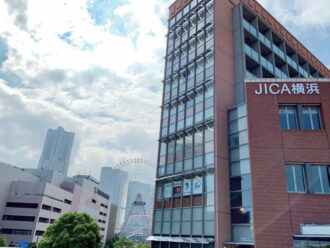 JICA Yokohama
JICA Yokohama
The JICA Yokohama International Center is a 10-minute walk from the Pacifico Yokohama venue for TICAD7 in the heart of the Minatomirai district of Yokohama.
JICA Yokohama has several functions, including providing training programs for some 700 participants from 90 countries every year; encouraging Japanese citizens to participate in development programs, such as Grass Roots Technical Cooperation projects initiated by local governments and NGOs; and supporting private Japanese companies, especially SMEs, in expanding their business in developing countries, which contributes to solving local problems with Japanese technology.
The Center also houses the Japanese Overseas Migration Museum, a library and a restaurant serving food from around the world. In the build up to TICAD7, Port Terrace Café is rotating five plate meals representative of five regions and fifteen countries of Africa.
Growing Friendship
At the citizen level, Yokohama has launched the “One School, One Country” project in which more than seventy municipal elementary and junior high schools study one of the thirty or more African countries that have embassies in Japan and forge links with them. As a highlight of the project, representatives of the embassy visit the participating school and teach the pupils in person about their country.
The affinity with African cultures being cultivated at Yokohama schools may partly explain the success of the African Festival Yokohama, a three-day celebration of African music, dance, arts, crafts and food that has become one of the city’s signature events. The 12th annual festival, which is distinguished by its bazaar-like feel and many workshops, was held in April.
All manner of side events have been arranged for the lead up to and during TICAD 7, a time when Yokohama’s quiet but sustained and invaluable engagement with Africa comes under the spotlight.
It’s all about to start, under the host city’s banner, “Africa and Yokohama, Sharing Passion for the Future.”
Reprint from “International Cooperation: TICAD7 bunting on the Grand Mall in Minatomirai, Yokohama,” The Japan Journal, July/August 2019 (Vol. 16 No. 2), pp. 26-27. [August 2019]
